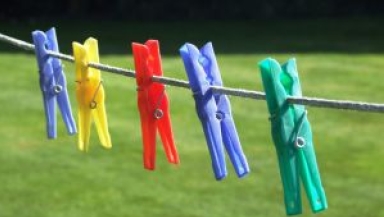
At this time of year when Spring has definitely sprung – many of us are tempted to clean up our home, sort through our wardrobe or tidy up the garden. It can be hugely satisfying to get rid of unwanted stuff, clear away the grime, fix anything that is broken and display what looks good. The same can be true with our friendships and relationships with loved ones.
Every now and again it is a good idea to have a look at our relationships and refresh any areas that need it. Here are a few suggestions to get your started:
1. Take stock
It can be helpful to stop and ask – how are you doing? Which relationships in your life are working well and which ones do you want to improve? In a recent survey I did 97.5 per cent of people said that their relationships could be improved so don't feel bad if you have areas of your relationships that could be better. You are in good company and being aware of what is not working is the first step to making a change.
2. Check under the rug
Do you have any hidden issues in your relationships? These are the unresolved issues that you find hard, painful or embarrassing to talk about. If you are someone who values keeping the peace or pleasing people then there might be some of these lurking under the rug. The trouble is they won't go away...they will just fester and grow bigger over time. Looking under the rug can take courage but often when we bring difficult issues into the light and talk about them – it can be a great relief.
3. Fix what's broken
Have you got any relationships that are a real struggle or ones that have been neglected? If so, how can you fix or invest in them? What one step could you take this week to improve the situation? Sometimes just doing something different can help change the dynamic in your relationship. If you can't fix a certain relationship for whatever reason – how can you best bring closure?
4. Keep what's working
It can also be helpful to focus on what is working in our relationships. Why not be intentional and do more of what works? For example, if your spouse reacts well and feels loved when you speak encouraging words, why not do that more? If your child responds well when you play with them one to one, why not plan some more time with them this week? Or if your best friend enjoys it when you initiate a plan, why not come up with something fun to do and invite them along?
5. Unblock any bitterness or resentment
Unresolved hurts or resentments can be toxic in a relationship. It can be helpful to recognise where you might have any of these and then contemplate what you can do about them. Forgiveness is a great antidote to buried hurts. Whether that is asking for forgiveness if you have caused harm (deliberately or not) and offering forgiveness when you have been hurt. Sometimes it will be appropriate to approach the person directly and talk it through but other times you can just forgive them in a prayer to God (or by writing a letter that you do not send).
Forgiveness doesn't mean saying what happened was ok (if it wasn't) but it does mean letting go. As you do that – healing and release have a greater opportunity to happen. Think about whom you might need to forgive or whom you might need to ask for forgiveness from.
6. De-clutter your priorities
What or who is most important in your life? According to research most of us can only maintain 12-15 close relationships at any one time. Who do you want those people to be in your life?
If we aren't intentional about how we spend our time or energy we can find that the most important people in our life are not getting the best of us. What could you do this week to be intentional about spending time on your closest relationships? What – if anything – needs to change to make these a priority?
7. Display your gratitude
I have found it can be too easy to keep my greatest treasures hidden. I have great thoughts about people but don't always share them. Most of us love to receive thanks, appreciation, gratitude, encouragement and words of love. Who could you show your appreciation to this week? Why not write them a card, record them a video, put a post-it-note on their desk or give them their favourite treat and express some of the positive thoughts about them that you might have kept to yourself.
8. Introduce some colour and interest
Having fun together and building shared memories can help to build resilience into a relationship. What do you love doing with your friends or loved ones? What new activities could you try together? One thing which can work with close family or friends is an ideas jar. Everyone writes down ideas for fun things to do together, and puts them in the jar. They don't need to be expensive but they do need to be activities that no one would hate to do! Then take turns pulling out the ideas and giving the activity a go.
9. Create a shopping list of missing items
So, be honest – what is missing from your relationships? Are you looking for love? Do you want more fun or excitement? Do you long for more time to spend with close friends? Do you wish you had greater depth in some of your relationships? Do you long for more people to pray or serve with?
One of the best ways I have found to respond to what I am missing is to give it. If I feel lonely – then I look for ways to connect with others, If I want more fun or excitement – I initiate activities with friends. If I long to spend more time – I make spending time with loved ones a priority. If I want greater depth – I try being more vulnerable and authentic in my relationships. If I long for fellowship or prayer – I approach people and invite them to join me.
What do you most want and how could you take steps to offer that to others?
10. Get help if you need it
We all need people in our lives who can champion us, encourage us, pray with us and challenge us. Who could help you to make the changes you want? What kind of help do you need? Who could you approach this week?
It can be hard sometimes to make changes on our own. That is why I created the Naked Hedgehog Bootcamp. The 30-day intensive online programme includes teaching, coaching and an online closed forum. It is wonderful to see the group encouraging and supporting each other as we make changes to our relationships and ourselves. I find each time I lead the course I discover some more defences and prickles that I can shed and am reminded about what is important in my life and relationships.
One participant on the last course wrote, "I feel I'm now much more able to communicate my feelings and needs with others, and share my authentic self, including my vulnerable side. Overall, the result is I have less prickles, a deeper connection with others and loads of hope for my future relationships."
I hope, however you decide to spring clean, that you find renewed sparkle, health and peace in your relationships in the weeks to come.
Sarah Abell is a writer, speaker and coach. Click here for more information on the next bootcamp which starts on March 16.
















